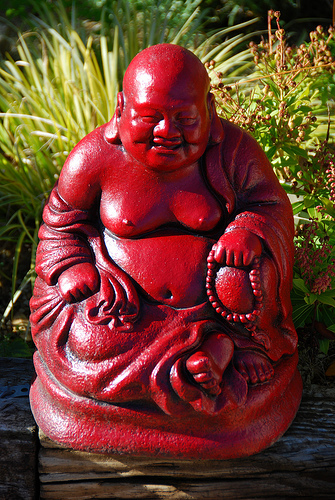“Aim above morality. Be not simply good, be good for something.” -Henry David Thoreau
An old friend of mine used to say she hated when people pushed their causes on her. She saw this as pestering and judgment–that she somehow wasn’t good enough because she ate meat, or didn’t help preserve endangered species, or didn’t send money to starving children in third-world countries.
She later told me that she felt disconnected from it all because she hadn’t found something that really moved her personally. Whenever someone told her about a fundraiser, she realized that she didn’t have an intrinsic motivation to offer her support, other than wanting to look good.
She wanted to make a positive difference in the world, but she felt so overwhelmed by the things that mattered to everyone else that she had a hard time identifying what mattered to her.
It made a lot of sense to me. While there’s something to be said for selfless giving, we’re more apt to make a consistent positive difference, whether through charity or work, if we discover what moves us and then let that lead the way. Then it’s not just about supporting a cause–it’s about having a cause to do it.
We all need to stand for something. We need to understand how we fit into the larger picture and how we can leave the world a better place than we found it. We need to feel that we can make a difference–that there’s something we can create, change, or improve to help other people.
Studies show that a sense of purpose is one of the strongest indicators of happiness. It’s not only beneficial to others; it’s also essential to our well-being that we find a way to give back. But we need to find it for ourselves–not because we should, or we want to look good, but because we genuinely care.
For me that cause is helping people let go of their pain. It matters to me deeply because I know firsthand how life can pass by when you hold onto the past. What do you stand for–and why?

Photo by bencrowe
About Lori Deschene
Lori Deschene is the founder of Tiny Buddha. She started the site after struggling with depression, bulimia, c-PTSD, and toxic shame so she could recycle her former pain into something useful and inspire others to do the same. You can find her books, including Tiny Buddha’s Gratitude Journal and Tiny Buddha’s Worry Journal, here and learn more about her eCourse, Recreate Your Life Story, if you’re ready to transform your life and become the person you want to be.
- Web |
- More Posts













 Though I run this site, it is not mine. It's ours. It's not about me. It's about us. Your stories and your wisdom are just as meaningful as mine.
Though I run this site, it is not mine. It's ours. It's not about me. It's about us. Your stories and your wisdom are just as meaningful as mine.
I completely agree! When I (finally – at 42 yrs old!) stumbled upon my own cause I felt like the world opened up. I recently made the transition to being vegan and felt a sense of calm and spiritual purposefulness I have never felt before. As part of this I was naturally pulled to support efforts to end factory farming. And, every day I aim to show that you can live a chic and stylish life without the use of animal products!
That’s wonderful that you’ve found that sense of spiritual purpose! I’ve seen some heart-wrenching factory farming videos, and they’ve been heart-breaking to watch.
I stand for education and enlighting others towards their path. I have been a teacher for 18 years and some days it’s harder than others but for the most part, it’s a rewarding job. I find it to be a calling to help guide young students to understand the world we live in and consciously make decisions that will impact the universe in a positive way. My indicator of happiness is when I see a student write a brilliant piece that comes from the heart or read a story and relate to the character’s sorrow or pain. Every day I see the lightbulbs turn on in their minds because of the discussions we have in the class. The best reward is when they come back as adults and tell me that I helped them get what they wanted out of life. It’s a cool job.
I can imagine. I have always admired teachers, particularly the ones who seem to have boundless energy and enthusiams with each new class of students. I imagine it isn’t an easy job, and yet it’s such an important one. I still remember the teachers who made the biggest difference in my life. Your students are lucky to have you. =)
I can imagine. I have always admired teachers, particularly the ones who seem to have boundless energy and enthusiams with each new class of students. I imagine it isn’t an easy job, and yet it’s such an important one. I still remember the teachers who made the biggest difference in my life. Your students are lucky to have you. =)
Your site is so powerful for me. It really gives me hints, good suggestions and life tips to help me find out what it’s all about (The meaning of life). Maybe if we feel less attached to other’s purpose, we may have the ability to find out our own goals and the things that really matter for ourselves. Take a time to focus on your own causes. It will not be powerful for yourself if you always seek for an outside approval. Find out the importance of being calm otherwise it will stay a mess. Have a nice exploration 🙂
I’m so glad the site has helped you! If we can look within and discover what really matters to us, I think we’ll be in great shape to make a positive difference for other people. It all starts with intention.
I feel like I have the same purpose and I think you have made it clear to me…years I have been trying to take people’s pain away but now I see that it only hurts me because I end up with it. Now I see that I have to help them get through it and not completely take it all.
That’s such an amazing insight. I’m a very empathetic person, and that’s something I have to watch out for, too. Thank you for reading and commenting. =)
I stand for environmental issues wishing I could do more. Would love to work on more health, education, and others
Thank you for writing an article I can really relate to. At the age of 16 I am very lucky to know who I am as a person and what I want to do with my life, however I have no clue what I stand for. There seems so many great causes (cancer research, education etc) and I just cant decide which cause I want to support. This has caused me many issues in mock college interviews and in my head girl interview as the question “what do you stand for” often recurs. I really want to use my energy to make a change but I don’t know which change is for me ??
You’re most welcome. For most people I know, the causes they want to support relate to something that’s happened to them or someone they love–whether that be an issue (like child abuse) or an illness. Perhaps this would be a good place to start–thinking about what’s affected you or the people you care about.